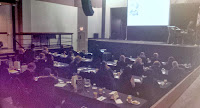 I was contacted about an opportunity that looked great. It was a speaking engagement at a business conference. The industry was new to me, but was going through massive change, which I knew well.
I was contacted about an opportunity that looked great. It was a speaking engagement at a business conference. The industry was new to me, but was going through massive change, which I knew well. The session title and synopsis referred to "change management" and the challenges it would discuss appeared to be ones I had experience in.
Over the weekend, I took a closer look at the session description and the conference agenda. Although "change" was referenced, objectives had little to do with the topic. The session was really about managing difficult relationships where few connections or little trust exists. It was a relationship management session.
My a-ha moment quickly turned into a feeling of dread. My enthusiasm for an opportunity was leading me down a path I did not know. I had three options:
 a) Do the presentation anyway
a) Do the presentation anywayb) Negotiate a new topic that I was qualified to speak about
c) Decline the opportunity
a) Doing the presentation anyway appealed to my "can do" attitude. With time, research and determination I could figure it out. The problem is that I would be compromising the value I provide, devote an inordinate amount of time researching a topic I wasn't knowledgeable on and potentially damage my reputation.
b) Negotiating a new topic could work but it wouldn't fit the themes of the conference so what would be the benefit? The poor fit of topic would compromise the value I could provide.
c) Declining the opportunity meant passing on an opportunity to share what I know with a group that might benefit from it. On the positive side, it would demonstrate honesty and integrity. This was the only credible option.
The next time an opportunity arises, I will ask better questions before I enthusiastically say "great". The most important one will be, "Is this a good fit for my skills, experience and goals? I know what I will say if the answer is no.
Phil




.jpg)
.jpg)



